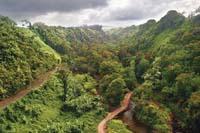McDonald's or Arzak?

To begin with, I will introduce what I mean. In the world we find more and more ecosystems dominated by exotic and invasive species. I am not referring to plantations, formations created by people with some specific objective, but to forests or other ecosystems that have developed as their own. Most of those engaged in nature conservation claim that these ecosystems are highly degraded or anthropized. And so, concerned about the problems that indigenous species can generate, they try to eliminate these ecosystems, if possible by recovering the original ecosystem of each place.
However, these sessions are often very difficult and expensive, since dealing with invasive species is very expensive. In addition, it is often uncertain what the source ecosystem was, if it is possible to recover it and if it is worth it when possible. For some enthusiastic conservationists yes, no doubt, because the originals are the ones that offer the most ecosystem services, you know, clean water, fertile lands, etc.
Now it seems that some have begun to discuss this point of view, or perhaps the debate that came long ago has strengthened. Some researchers are studying these new ecosystems, which are not only interesting, but are sometimes very diverse and offer many services. This has motivated the question whether it is better to allow the development of these new ecosystems than to try to recover at all costs the original ecosystems.
So far a description of the debate, from now on my opinion.
Undoubtedly, invasive species are very interesting, if not, to understand why they become invasive. And, of course, these ecosystems of invaders can be of great interest, since from them you can learn a lot about the self-organization of ecosystems. Moreover, I recognize that in many cases we exaggerate the services of the original ecosystems. On the one hand, whether it serves or not, because it does not depend on its origin but on other more detailed characteristics. And on the other hand, we must value nature according to what it gives us, because not only did we give it, but depending on the price that our baby can have.
But there is something that worries me most about all this. There is no doubt that nowhere in the world will be discovered such a diverse ecosystem as ancient ecosystems, and there are invasive species that have integrated into natural ecosystems without destroying original species. Examples can be found in the article mentioned at the end. But I think the most common is the opposite: in these new ecosystems there are few species that have no interest in conservation, and as exotic species expand, autochthonous species are often destroyed. That is, if we look at the problem at the world level, this means the loss of many species, since the common in many places becomes increasingly common while losing local specificity. We just have to look at our rivers. Most fish species present in the Iberian Peninsula are exotic, constituting the main danger to the survival of native species. This does not mean that we have to eradicate exotic species, since, as in agriculture, many of them have interesting uses in other areas. But we are equating the world at full speed, shifting customs, ways of life and species, and that makes the world more boring.
Of course, it is not, it cannot be, to recover a natural state that people have not touched. I don't think anyone is working on it. It is, in any case, to preserve part of the enormous diversity that the world has had until recently, to maintain some of the ecosystems that nature has developed in an experiment of millions of years, considering that outside it is transforming day by day.
Otherwise, we want to preserve natural ecosystems so that our children know the wonderful diversity the world had until recently. If they offer us interesting services, better, but we also want to keep them. You can forgive me, but I will cast a serious heresy. I don't think McDonald's and Arzak are very different foods. The second, of course, has a much more careful cuisine, but I would not want to be obliged to eat the local tasting menu every day. But even if its value to fill the belly is not very different, you will not deny me that the world would be much sadder if all dining rooms were taken by McDonald's. Here too the key is diversity.
To learn more: Marris, E. 2009. Ragamuffin Earth. Nature, 460:450-453.
Buletina
Bidali zure helbide elektronikoa eta jaso asteroko buletina zure sarrera-ontzian








